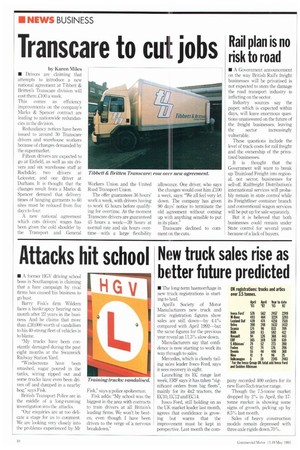Transcare to cut jobs ilsak ptolarnoiasdno
Page 12

If you've noticed an error in this article please click here to report it so we can fix it.
by Karen Miles • Drivers are claiming that attempts to introduce a new national agreement at Tibbett & Britten's Transcare division will cost them ,£100 a week.
This comes as efficiency improvements on the company's Marks & Spencer contract are leading to nationwide redundancies in the division.
Redundancy notices have been issued to around 30 Transcare drivers and warehouse workers because of changes demanded by the supermarket.
Fifteen drivers are expected to go at Enfield, as well as six drivers and six warehouse staff at Rochdale: two drivers at Leicester, and one driver at Durham. It is thought that the changes result from a Marks & Spencer demand that delivery times of hanging garments to 60 sites must be reduced from five days to four.
A new national agreement which cuts drivers' wages has been given the cold shoulder by the Transport and General Workers Union and the United Road Transport Union.
The offer guarantees 36 hours' work a week, with drivers having to work 45 hours before qualifying for overtime. At the moment Transcare drivers are guaranteed 45 hours a week-39 hours at normal rate and six hours overtime— with a large flexibility allowance. One driver, who says the changes would cost him £100 a week. says: "We all feel very let down. The company has given 90 days' notice to terminate the old agreement without coming up with anything sensible to put in its place."
Transcare declined to comment on the cuts. • A Government announcement on the way British Rail's freight businesses will be privatised is not expected to stem the damage the road transport industry is inflicting on the sector.
Industry sources say the paper, which is expected within days. will leave enormous questions unanswered on the future of the freight businesses, leaving the sector increasingly vulnerable.
These questions include the level of track costs for rail freight and the ownership of the privatised businesses.
It is thought that the Government will want to break up Trainload Freight into regional, not sector, businesses for sell-off. Railfreight Distribution's international services will probably remain in state control while its Freightliner container branch and conventional wagon services will be put up for sale separately.
But it is believed that both businesses could remain under State control for several years because of a lack of buyers.
































































































































